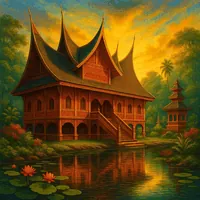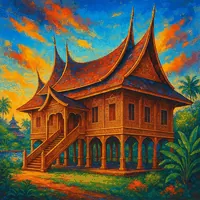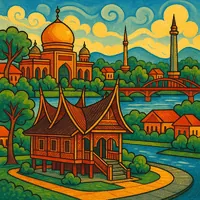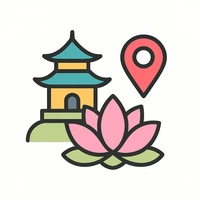Nestled along the Batang Hari River, Jambi city is a gateway to Indonesia's rich history and ecological wonders. Unique for its proximity to the ancient Muaro Jambi Temple Complex, one of Southeast Asia's largest archaeological sites, Jambi invites exploration of its mysterious Buddhist past. Additionally, the city borders the vast Bukit Duabelas National Park, home to the indigenous Orang Rimba people, offering a rare glimpse into their nomadic jungle lifestyle and vibrant cultural tapestry.

Destinations

Travel Tips & Planning

General City Overview
Notable points about Jambi
- Historical Significance: Jambi is home to the Muaro Jambi Temple Complex, one of the largest archaeological sites in Southeast Asia, which dates back to the 7th century. This site provides a fascinating glimpse into early Buddhist influences and the Srivijaya civilization.
- Distinct River Culture: Unlike many other cities in Indonesia, Jambi is situated on the banks of the Batang Hari River, the longest river in Sumatra. The river plays a central role in daily life and offers unique opportunities for river-based tourism and community activities.
- Flourishing Oil Palm Industry: Jambi is a hub for Indonesia’s oil palm industry, making it a vital part of the country’s economy. Visitors can explore plantations and learn about the production processes, which is an intriguing option for agricultural enthusiasts.
- Exploration for Nature Lovers: Bukit Tiga Puluh National Park offers an expansive natural habitat where travelers can experience lush rainforests and diverse wildlife, including the endangered Sumatran tiger, making it a perfect adventure for nature lovers and wildlife enthusiasts.
- Cultural Mosaic: Jambi is culturally diverse with influences from Malay, Javanese, Chinese, and indigenous ethnic groups. This cultural amalgamation is evident in the city’s culinary delights, traditions, and vibrant festivals, providing a rich cultural experience.
- Developing Urban Scene: For young singles and professionals, Jambi presents an emerging urban lifestyle with its growing number of cafes, shopping centers, and nightlife options, offering a more laid-back and less congested alternative to the hustle and bustle of Jakarta.
- Rich Indigenous Heritage: The city is unique for its close proximity to indigenous communities, such as the Anak Dalam Tribe, allowing visitors to engage with and learn from rich traditional customs and lifestyles that have been preserved for generations.
- Gateway to the Past and Present: While Jambi's archaeological sites give insight into its ancient past, the city also prides itself on modern developments, balancing history with contemporary progress, appealing to tourists interested in both historical and modern attractions.
- Family-Friendly Environment: Jambi provides a safe and welcoming atmosphere for families, with numerous parks, museums, and educational establishments, fostering a nurturing environment for children’s growth and learning.
- Unique Geographical Contrast: Unlike many Indonesian cities, Jambi is endowed with both flat lowlands and rugged highlands, offering diverse landscapes for travelers seeking both relaxation and adventure in a singular location.
Summarized User Reviews
Took a boat ride at sunset on the Batanghari—so peaceful, like the river was whispering stories from the past.
Loved the food stalls, especially the tempoyak durian. Not for everyone, but it hits the spot if you're into bold flavors!
The Muaro Jambi temples are unexpectedly vast and calm. You can walk for hours and just feel the history.
City roads can be a mess during rush hour, and not many walkable areas unless you’re near the markets.
The people here treat you like family. Was invited to a local wedding and danced like I belonged there!
Interactive Word Cloud for Jambi

















































































































